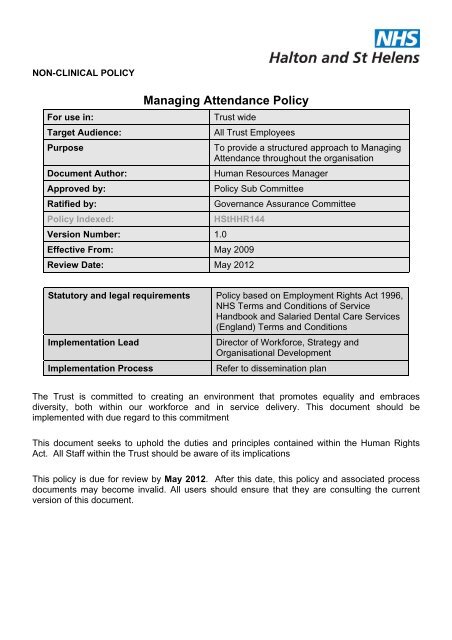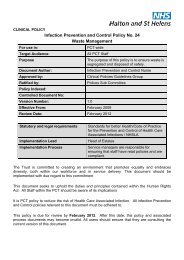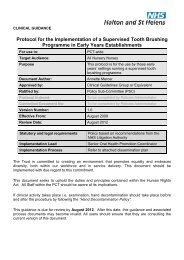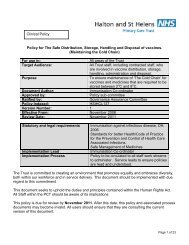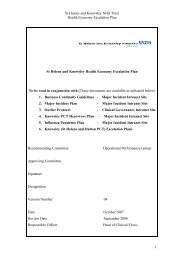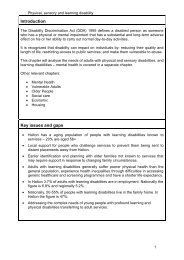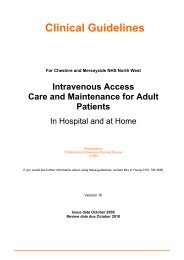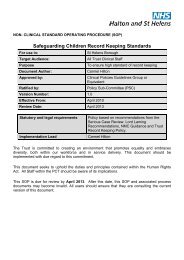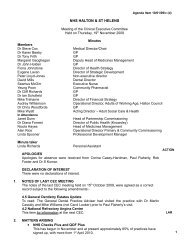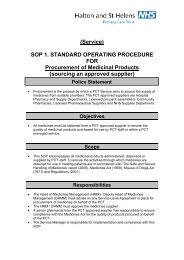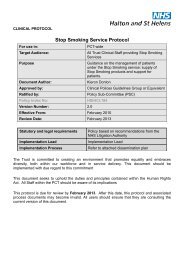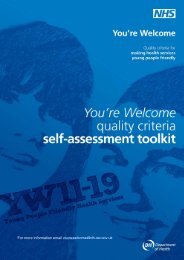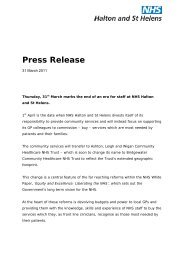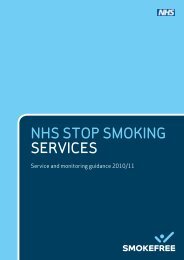Managing Attendance Policy - Halton and St Helens PCT
Managing Attendance Policy - Halton and St Helens PCT
Managing Attendance Policy - Halton and St Helens PCT
You also want an ePaper? Increase the reach of your titles
YUMPU automatically turns print PDFs into web optimized ePapers that Google loves.
NON-CLINICAL POLICY<strong>Managing</strong> <strong>Attendance</strong> <strong>Policy</strong>For use in:Trust wideTarget Audience:All Trust EmployeesPurposeTo provide a structured approach to <strong>Managing</strong><strong>Attendance</strong> throughout the organisationDocument Author:Human Resources ManagerApproved by:<strong>Policy</strong> Sub CommitteeRatified by:Governance Assurance Committee<strong>Policy</strong> Indexed:H<strong>St</strong>HHR144Version Number: 1.0Effective From: May 2009Review Date: May 2012<strong>St</strong>atutory <strong>and</strong> legal requirements <strong>Policy</strong> based on Employment Rights Act 1996,NHS Terms <strong>and</strong> Conditions of ServiceH<strong>and</strong>book <strong>and</strong> Salaried Dental Care Services(Engl<strong>and</strong>) Terms <strong>and</strong> ConditionsImplementation LeadImplementation ProcessDirector of Workforce, <strong>St</strong>rategy <strong>and</strong>Organisational DevelopmentRefer to dissemination planThe Trust is committed to creating an environment that promotes equality <strong>and</strong> embracesdiversity, both within our workforce <strong>and</strong> in service delivery. This document should beimplemented with due regard to this commitmentThis document seeks to uphold the duties <strong>and</strong> principles contained within the Human RightsAct. All <strong>St</strong>aff within the Trust should be aware of its implicationsThis policy is due for review by May 2012. After this date, this policy <strong>and</strong> associated processdocuments may become invalid. All users should ensure that they are consulting the currentversion of this document.
Key individuals involved in developing the documentNameDesignationVikki MorrisLisa HasseyEquality <strong>and</strong> Diversity ManagerHuman Resources ManagerCirculated to the following for commentsCommitteeCommitteeMembers of the <strong>Policy</strong> Sub CommitteeJoint <strong>St</strong>aff GroupIndividualNameDesignationPaula WoodsDeputy Director Workforce <strong>St</strong>rategyPage 2 of 31
Table of ContentsIntroduction ..................................................................................................................................4Purpose........................................................................................................................................4Scope...........................................................................................................................................5Responsibilities ............................................................................................................................5<strong>Attendance</strong> <strong>St</strong><strong>and</strong>ards..................................................................................................................8<strong>Managing</strong> Short Term Absence .................................................................................................18<strong>Managing</strong> Long Term Absence ..................................................................................................22References.................................................................................................................................27Associated Documentation ........................................................................................................27Audit <strong>and</strong> Review .......................................................................................................................27Appendix 1 .................................................................................................................................28Appendix 2 .................................................................................................................................29Appendix 3 .................................................................................................................................31Page 3 of 31
INTRODUCTIONThe NHS Commits to provide support <strong>and</strong> opportunities for staff to maintain theirhealth, well-being <strong>and</strong> safety.The Trust recognises that staff are its most important resource in providing an efficient <strong>and</strong>effective service in the boroughs it serves. Whilst recognising that staff will be absent from timeto time due to illness, the Trust will endeavour to support staff in a proactive manner withrecovery <strong>and</strong> return to good health.The continued delivery of services cannot be sustained if staffing levels fall below plannedneeds <strong>and</strong> expectations due to high levels or sustained sickness absence. High levels ofsickness absence will have an adverse impact on the level <strong>and</strong> quality of service provided,place an additional burden on other staff <strong>and</strong> have considerable cost implications.The aim of the <strong>Policy</strong> for <strong>Managing</strong> Absence is to ensure that the Trust will deal with sicknessabsence in a pro-active, clear <strong>and</strong> consistent manner. The Trust also recognises that theworkplace can be a contributing factor to illness, <strong>and</strong> will therefore take seriously itsresponsibilities in relation to physical <strong>and</strong> mental wellbeing in the workplace. Whilst taking asupportive approach with all absence cases, it must be recognised that continued absence fromwork may ultimately result in the termination of employment.PURPOSEThe purpose of this policy is to provide: A framework to build <strong>and</strong> instil a positive culture of attendance supported by theTrust’s commitment to staff well-being Information to all staff about the Trust’s approach to promoting attendance at workthrough the effective management of sickness absence Practical guidance to staff about their responsibilities in relation to their absence Practical guidance to managers on managing absence in a fair <strong>and</strong> consistent way The role of the Human Resources Department The role of the Occupational Health Team The role of the Health & Safety DepartmentObjectives / OutcomesTo ensure sickness absence is pro-actively <strong>and</strong> consistently managed throughout the Trust <strong>and</strong>to provide support <strong>and</strong> effective interventions to maintain the health <strong>and</strong> well-being of allemployees.Page 4 of 31
SCOPEThis policy <strong>and</strong> associated procedures apply to all Trust employees. The policy also coversabsence due to exceptional circumstances <strong>and</strong> absence without permission. This policyinterlinks with other policies, including the Annual Leave <strong>Policy</strong>; Carer <strong>and</strong> Special Leave <strong>Policy</strong>;Maternity Leave <strong>Policy</strong>; Disciplinary <strong>Policy</strong>; Capability <strong>Policy</strong>; Infection Control Policies <strong>and</strong> therelevant sections of the Agenda for Change NHS Terms <strong>and</strong> Conditions of Service H<strong>and</strong>book(Part 3: Section 14 <strong>and</strong> Annex Z).RESPONSIBILITIESThe Trust recognises varying responsibilities throughout the organisation as follows:-Trust ResponsibilitiesThe Trust will ensure that it: Fulfils its duty of care in relation to responsibilities for physical <strong>and</strong> mental well-beingof staff Supports staff by actively promoting staff well-being through the work environment byhelping people maintain or improve their health Pro-actively helps <strong>and</strong> supports people whilst absent through to return to work Support Managers in fulfilling their responsibility to deliver services to the people of<strong>Halton</strong> & <strong>St</strong>. <strong>Helens</strong>.Management ResponsibilitiesManagers will ensure that: The welfare of all employees within their Directorate/Department/Team is a highpriority, in accordance with the Trust’s commitment to staff well-being Risk assessments are undertaken, reviewed <strong>and</strong> revised as appropriate All staff are properly <strong>and</strong> adequately trained to undertake their duties, provided withthe proper tools <strong>and</strong> equipment <strong>and</strong> are working in a safe environment They underst<strong>and</strong> <strong>and</strong> take responsibility for following the policy <strong>and</strong> procedures forthe management of sickness within their Directorate / Department / Team Return to Work interviews are carried consistently following an employees period ofsickness absence They maintain accurate records of sickness absence, <strong>and</strong> these are monitored <strong>and</strong>managed as set out in the process They treat each case of sickness absence with sympathy <strong>and</strong> sensitivity, <strong>and</strong> applyprocesses fairly <strong>and</strong> consistently They maintain regular contact with staff who are absent to let them know they aremissed, keep them up to date, offer support <strong>and</strong> signposting <strong>and</strong> to monitor theirprogressPage 5 of 31
All notes <strong>and</strong> paperwork in relation to sickness absence reviews are retained bythemselves, in accordance with Data Protection principles, until completion of thereview at which point they will be forwarded to Human Resources to be held centrally They undertake all actions within given timescales, except where circumstance doesnot permit this All information is treated with confidentiality Fit Notes <strong>and</strong> self-certificates are copied for locally held personal files <strong>and</strong> theoriginals sent through to Pay <strong>and</strong> <strong>St</strong>aff Services at Whiston Hospital Inform the Health <strong>and</strong> Safety Department of any absences due to an injury or diseaseat work, completing a RIDDOR form as appropriate <strong>Attendance</strong> is improved through a positive attitude <strong>and</strong> management of each case Guidance from Human Resources, Health <strong>and</strong> Safety <strong>and</strong> Occupational Health will besought in line with processEmployee ResponsibilitiesEmployees will:Follow the correct procedures for notification of sickness absence for every period ofabsenceEnsure their sick notes are sent to their Line Manager promptlyMaintain contact with their Line Manager or nominated person throughout the periodof absenceUndertake treatment as guided by their Medical PractitionerAttend Occupational Health Reviews identified as appropriateRefrain from activities that will delay their return to workParticipate in rehabilitation programmes <strong>and</strong> modification to duties as advised by theirLine Manager/Occupational HealthInform their Line Manager or an appropriate person promptly if problems occur whichimpact on their physical or mental well-being in workMaintain appropriate ‘Professional Registration whilst off sick. Failure to maintainregistration may result in a down grade in line with the ‘Professional Registration’policy <strong>and</strong> may affect sick payHuman Resources ResponsibilitiesHuman Resources will: Maintain a neutral response in advising <strong>and</strong> supporting both staff <strong>and</strong> Line Managersin the application of procedures Undertake all actions within the given timescales, except where circumstance doesnot permit this Work with Line Managers to ensure the sickness management process is appliedfairly <strong>and</strong> consistentlyPage 6 of 31
Ensure Line Managers are trained appropriately in the process <strong>and</strong> updated asnecessary in line with relevant legislation or practice guidanceHealth <strong>and</strong> Safety ResponsibilitiesHealth <strong>and</strong> Safety will: Work with staff <strong>and</strong> Managers to ensure risk assessments are completed asappropriate Advise staff as appropriate of responsibilities in line with current legislation for health<strong>and</strong> well-being at work At the request of Human Resources or Managers work with staff to complete specificrisk assessments in relation to continued or persistent absence <strong>and</strong>/or injury at work Notify the Health <strong>and</strong> Safety Executive as appropriate under RIDDOR for appropriateabsences<strong>St</strong>aff-Side Responsibilities<strong>St</strong>aff-Side will:Support staff <strong>and</strong> Managers in the application of procedures Undertake all actions within given timescales, except where circumstance does notpermit thisContribute to review <strong>and</strong> improvement of the processOccupational Health ResponsibilitiesOccupational Health will: Work in partnership with staff, the employees GP <strong>and</strong> the Human Resources Team toprovide individual health assessments for staff in order to advise Managers <strong>and</strong> staffon rehabilitation, redeployment <strong>and</strong> retraining as appropriate In consultation with the Human Resources Department, to refer to appropriateSpecialists where necessary following health assessment Advise staff <strong>and</strong> Managers on the justification for ill-health retirement Offer expert clinical advice <strong>and</strong> support to the Trust with complex cases Advise staff <strong>and</strong> Managers on the management of injuries <strong>and</strong> ill health sustained atwork Provide proactive Occupational Health services to reduce the likelihood of sicknessabsence (pre-employment screening, immunisation programmes, visual screening,health surveillance etc) Provide counselling to all staff via the counselling servicePage 7 of 31
ATTENDANCE STANDARDSThe Trust promotes values, behaviours <strong>and</strong> working practices which recognise the differencesbetween people <strong>and</strong> thereby enhance staff motivation <strong>and</strong> performance to release potential,delivering improved services to customers.The Trust is committed to eliminating discrimination within all areas of the employmentrelationship (including job applicants) <strong>and</strong> to encourage <strong>and</strong> promote diversity. The Trustrecognises the right of all employees to be treated fairly, consistently <strong>and</strong> considerately <strong>and</strong> willensure that its policies <strong>and</strong> procedures demonstrate commitment to equality <strong>and</strong> fairness for all.The Trust aims to ensure that its workforce composition is truly representative of the localcommunity. It will also ensure that it has a culture that values equality <strong>and</strong> diversity <strong>and</strong>recognises that diversity adds value through enabling the Trust to provide responsive <strong>and</strong>quality services to all patients <strong>and</strong> clients.Whilst taking a supportive approach with all absence cases, it must be recognised thatcontinued absence from work may ultimately result in the termination of employment.DefinitionDefinitionShort-term absenceLong term absenceUnacceptable patternsTrigger <strong>St</strong><strong>and</strong>ard3 absences or 10 days sick leave in arolling 12 month period4 weeks (28 days) consecutive absence ormore in a rolling 12 month periode.g. regular Friday or Monday’sThe st<strong>and</strong>ards above would be applied whether or not absences have been covered by amedical certificate.Procedure for Notification of Sickness AbsenceAny employee who is not fit to attend work must do the following:Make contact with their Line Manager/Supervisor, before the shift/work starts ifpossible, so cover can be arranged if appropriate. Where it is not possible to makecontact before the shift/work starts, contact should be made no later than 30 minutesafter their expected start time on the first day of absence. In exceptionalcircumstances (e.g. unexpected hospitalisation) it would be acceptable for a familymember to contact Line Manager / Supervisor on their behalf.If Line Manager / Supervisor is not available then they should contact the next level ofmanagement, ultimately the Service Director is necessary.Page 8 of 31
When calling, employees should state the reason for their absence <strong>and</strong> when theyexpect to return to work.Messages should only be left with other team members if it is not possible to speakwith your Line Manager. It is not acceptable to e-mail or text an absence notification.Employees should agree with their Line Manager when notifying of absence howregular contact will be maintained, <strong>and</strong> that they will notify their Line Manager of theirreturn date.If an absence lasts longer than 3 calendar days (this includes weekends <strong>and</strong> BankHolidays) then a “self-certification” form should be completed. These are available onthe Trust intranet <strong>and</strong> from GP Surgeries <strong>and</strong> Benefit Offices; alternatively you canaccess this at www.hmrc.gov.uk/forms/sc2.pdf. It is the employee’s responsibility tocomplete this form <strong>and</strong> return it to their Line Manager within 2 working days from thedate of issue.If an absence lasts longer than 7 calendar days (including weekends <strong>and</strong> BankHolidays) then a Fit Note from a GP or hospital must be obtained. The Fit Note mustbe sent to the Line Manager within 2 working days from the date of issue from theGP.It is the employee’s responsibility to ensure their absence is accurately notified inorder to maintain sick pay as appropriate.<strong>St</strong>aff will need to ensure their Fitness for Work Note covers their period of absence,<strong>and</strong> therefore must ensure that certificates follow concurrently.The Fitness for Work Note will detail whether a further assessment on fitness to workis needed at the end of the stated periodIf absence is due to an injury or disease caused by work then staff must ensure theyreport this as soon as known to their Line Manager in order that appropriate advice<strong>and</strong> forms can be completed.<strong>St</strong>aff will not be entitled to an additional day off if sick on a statutory holiday.Breaches of the ‘<strong>Managing</strong> <strong>Attendance</strong>’ <strong>Policy</strong> will be dealt with under the Disciplinary <strong>Policy</strong>,<strong>and</strong> could result in disciplinary action.Conduct during Sickness AbsenceIn all cases of sickness or injury that necessitate taking time off work, it is expected that staff willdo their utmost to facilitate their return to fitness <strong>and</strong> to work. In this regard, staff are expectedto act sensibly <strong>and</strong> honestly. The Trust would not, in normal circumstances expect an employeewho is absent from work due to sickness or injury to: Participate in any sports, hobbies, social activities etc, which are in any wayinconsistent with their stated illness or injury or which could aggravate the illness orinjury or which could delay or impede recovery Undertake any other employment whether paid or unpaid. A breach of any of the above could be deemed to be gross misconduct <strong>and</strong> may leadto dismissal under the Disciplinary Procedure.Page 9 of 31
NHS Professionals & Bank Work Trust staff absent from their substantive post due to sickness must not acceptassignments offered by NHS Professionals. Working on an assignment through NHSProfessionals whilst on sick leave would constitute a disciplinary offence <strong>and</strong> couldlead to summary dismissal from their substantive post. Substantive employees who are absent due to sickness cannot work a secondarypost or bank shift (whether bank for this Trust or another NHS Organisation). Bank staff with this Trust who are absent due to sickness from their substantive post(with another organisation) must speak with their Bank Line Manager beforeundertaking bank hours with this Trust In situations where, following discussion with the staff member, it is evident they arenot managing to fulfil contracted hours (such as returning after sickness on a phasedbasis), or where a condition may be aggravated by additional work, staff will not beallowed to perform Bank/Agency/Overtime work for a specified time as agreed withtheir manager on return to work.If attendance levels are generally poor (i.e. being managed under this policy <strong>and</strong>/or theDisciplinary <strong>Policy</strong>, Capability <strong>Policy</strong>), the Trust reserves the right to ensure the staff member isnot granted any Bank/Agency/Overtime work until such time as their attendance level isacceptable.Absence without PermissionIf a member of staff does not turn up for work <strong>and</strong> makes no contact, it is the Line Manager’sresponsibility to try to establish contact. Initial contact should be made by phone on the first day.If contact cannot be established a letter should be sent to the home address in line with theprocess set out below. In exceptional circumstances <strong>and</strong> serious concern for the well being ofthe member of staff, a visit in person may be necessary. The Line Manager should bear in mindpersonal <strong>and</strong> domestic circumstances <strong>and</strong> should take all reasonable steps to establish contactwith those who live alone or are known to have difficult circumstances. If in any doubt, the LineManager should seek the advice of Human Resources.If contact cannot be established, the Line Manager must follow the procedure below,maintaining contact with Human Resources throughout the process: All correspondence must be discussed <strong>and</strong> agreed with Human Resources in the firstinstance Any correspondence must be marked Private & Confidential Write to the staff member asking them to contact you to discuss their absence. Theletter must be sent recorded delivery. If you do not receive a reply <strong>and</strong> no information comes to light from other sources e.g.work colleagues, then a second letter should be sent. This letter will outline that theirpay will be stopped if no contact is made by a given date. This letter must also besent recorded delivery.Page 10 of 31
If the member of staff returns to work then the Line Manager must carry out aninvestigatory interview to establish the reasons for absence. It may be appropriate totreat the situation as misconduct, <strong>and</strong> could ultimately result in their dismissal. Pleaserefer to the Disciplinary <strong>Policy</strong> <strong>and</strong> seek advice from Human Resources in thesecircumstances. If the member of staff does not return to work then a letter should be sent stating thattheir pay has been stopped. Sick pay may be withheld until contact has been established with the member of staff<strong>and</strong> we are aware their absence is due to sickness. The Line Manager will seek theadvice of Human Resources when considering refunding sick pay where there was agenuine reason why the member of staff could not contact the Line Manager on theirfirst or subsequent days of absence. Line Managers must discuss with Human Resources the next steps where pay hasbeen stopped <strong>and</strong> there is no contact from the employee.It is important to note that the Trust is expected to make every effort to make contact with theindividual <strong>and</strong> to pay due regard to domestic <strong>and</strong> personal circumstances.Sickness <strong>and</strong> Annual LeaveIt is not permissible to replace sickness absence with annual leave.Conditions regarding sickness during or immediately prior to / after a Bank Holiday or AnnualLeave: <strong>St</strong>aff who become unwell during the course of annual leave or immediately prior to orafter a public holiday should contact their Line Manager as soon as possible to notifythem of the situation. <strong>St</strong>aff may be required to produce a medical certificate even ifthe absence is less than 7 days, where it can be demonstrated there has been aprevious record or pattern of absences at such times. If a member of staff falls sick during a period of annual leave, they must contact theirLine Manager to notify them of the situation <strong>and</strong> a Fit Note should be provide toenable the appropriate period of annual leave be reinstated. This can then be takenat a later date in agreement with the Line Manager. <strong>St</strong>aff will not be entitled to an additional day off if sick on a statutory holiday. In line with legislation employees accrue annual leave whilst on sick leave <strong>and</strong> if theyare unable to take annual leave due to sickness absence within the current year theyare allowed to carry this over until the next annual leave year <strong>and</strong> take the leave upontheir return to work If an employee returns to work within year then any accrued annual leave must betaken within that annual leave year – unless there is an agreement by their managerto allow the maximum 5 day carry over The period of annual leave that is carried over due to sickness absence will be takenat an agreed time between Manager <strong>and</strong> employer to ensure that it does not have anadverse affect on the needs of the service.Page 11 of 31
Employees that carry over annual leave due to sickness absence to the next yearshould have this leave built into a phased return agreement (if they have a phasedreturn to work)Accrual of statutory (not contractual) annual leave will be paid upon termination ofemployment due to ill health. <strong>St</strong>atutory leave as of April 2009 is 5.6 weeks, inclusiveof bank holidaysEmployees should request annual leave in the normal way via their Manager evenwhen on sick leave For Example - if going on holiday abroadAnnual leave will be granted to an employee that is off sick to allow the employee totake a holiday for convalescence purposes For Example if an employee is absentfrom work due to stress/depression a holiday may aide an earlier return to work. Theannual leave used can be deducted from the employee's annual leave entitlement -but only if the employee if on agreement to this. If the employee does not agree tothe leave being deducted then Managers need to explore the reasons for the holidayrequest <strong>and</strong> ensure it is for convalescence; if it is, the Manager should still grant thetime away but not deduct the time from the employees annual leave entitlement - thisis to ensure that annual leave is utilised appropriately <strong>and</strong> is in line with legislationConditions regarding taking holidays whilst off sick: In some instances it may be appropriate for a member of staff to take a holiday/periodof leave away from home during a period of sickness absence e.g. for convalescencepurposes. Before taking any such leave, staff must contact their Line Manager toinform them of the proposed dates. The period of leave will still be counted assickness for the purpose of recording sickness absence <strong>and</strong> calculating pay for thisperiod.Medical Appointments Non urgent, regular <strong>and</strong>/or routine health, medical <strong>and</strong> dental appointments should bearranged outside of contracted hours – particularly if an individual is part time Managers should exercise flexibility with lunchtimes, start times etc.. It is accepted there will be exceptional circumstances <strong>and</strong> these should be discussedwith your Manager <strong>St</strong>aff that are unable to get routine health, medical <strong>and</strong> dental appointments outside oftheir contracted hours will be required to make the time back Only emergency appointments should be taken within working hours without thenecessity of making the time back All appointments need to be evidenced. It is accepted that evidence may only beobtained on attending the appointment <strong>and</strong> not prior. In any event evidence of theappointment will be required including the time <strong>and</strong> date of the appointment. It is notacceptable for employees to advise they were unable to obtain evidence; evidencecan be appointment card, letter, h<strong>and</strong>written note on company headed or stampedpaper Where a number of appointments are required on an on-going basis or over a shortterm period due to a health issue, the staff member should discuss this with their LineManager as soon as they are aware. Whilst support will be provided by the LineManager for attendance, co-operation from staff in underst<strong>and</strong>ing the necessity forPage 12 of 31
If there is a need for long term appointments then Managers are required to refer thestaff member to Occupational Health to ensure the appropriate support is providedwithin the workplace In relation to health tests required during the working day, it is expected that staff willreturn to work after such tests, unless it is expected that the testing will causetemporary ill health. In such instances, agreement should be made with the LineManager prior to appointments <strong>and</strong> use of other forms of leave should be considered. When attending an Occupational Health or other appointment at the request of theTrust staff will not be expected to make up the time taken in relation to travel <strong>and</strong>length of appointment.<strong>St</strong>atement of Fitness for Work – Changes to Medical CertificationFrom 6 April 2010 the medical certificate is changing to become a fit note. The old MedicalCertificates or sick notes provided advice about whether or not an individual with a healthcondition is fit for work.Many employees with health conditions can, with some basic support work as they recover fromtheir condition. The new fit note system will mean that GP’s can advise employees: -Unfit for work; orMay be fit for some workA GP will give a ‘may be fit to work’ statement if they think their patients health condition mayallow them to work if they get suitable support from their employer. This support maybe:Phased return to workAltered hoursAmended duties; <strong>and</strong>/orWorkplace adaptionsThe GP may also offer written comments on the Fitness for Work statement giving a moredetailed view of the kind of things that may help. For example how an employee’s condition willaffect what they do <strong>and</strong> some of the things that could help employees return to work. Thechanges are not about trying to get people back to work before they are ready, but aboutremoving the challenges to them returningThe statement is not binding <strong>and</strong> if the adjustments cannot be made discussions need to takeplace between the employee <strong>and</strong> Manager as to why they cannot be made. The employeedoes not need to go back to their GP for a new statement if adjustments cannot be made.However these discussions should be documented.Page 13 of 31
Advice should be sought from HR if adjustments cannot be made because as an organisationwe need to evidence that wherever possible reasonable adjustments are made to assist inpeople returning to work. For the more complex cases advice should be sought fromOccupational HealthIf an employee is too ill to work the doctor will advise this just like with the old MedicalCertificate or sick note.Further guidance on the <strong>St</strong>atement of Fitness for Work can be found on the intranet underHuman Resources/Wellbeing/Absence Management.In exceptional cases, at any stage of the <strong>Policy</strong>, the Trust may require staff to provide Fitnessfor Work Notes for every period of sickness. Following discussion with Human Resources, theDepartment will reimburse the employee the cost of providing such notes. The circumstanceswhen a note may be requested could be:- Regular absences of less than eight days which are not reducing sufficiently overtime. Regular absences that occur immediately prior to or after a period of annual leave orpublic holidays. Concern that there may be an underlying health problem which the employee has notbrought to the attention of their GPUse of ‘Fake’ Fitness for Work NotesFraudulent use of fit notes will be fully investigated by Mersey Internal Audit Agency (MIAA).<strong>St</strong>aff found to have submitted fake fit notes will be subject to the Trust Disciplinary Procedure.Employees undergoing Fertility TreatmentEmployees should refer to the Maternity Leave <strong>Policy</strong>. Appointments for IVF treatment will betreated in the same way as other medical appointments. Any subsequent absence due tosickness from treatment will be treated in the same way as other sick leave provision.Elective Cosmetic SurgeryThe Trust would expect staff to use annual or unpaid leave when undergoing elective cosmeticsurgery. This must be agreed in advance with your Line Manager as stipulated in the Annual orSpecial Leave <strong>Policy</strong>. Any subsequent absence due to sickness from treatment will be treated inthe same way as other sick leave provision.Infection ControlAll staff, particularly clinical staff, should be aware of their responsibilities under the variousInfection Control Policies, to reduce the risk of spreading infection when unwell.Page 14 of 31
Medical SuspensionIn circumstances where a staff member’s state of health, in the opinion of the Line Manager,constitutes a risk to the safety of the individual, other staff or patients, the staff member will berequired to attend Occupational Health <strong>and</strong> may be suspended on medical grounds for aspecified period. The staff member will receive full pay for the period of the suspension. Thiscourse of action must be undertaken in accordance with suspending authority outlined in theDisciplinary <strong>Policy</strong> <strong>and</strong> Procedure.Recruitment <strong>and</strong> Induction No applicant will be appointed to the Trust before health fitness clearance to undertakethe post is provided by Occupational Health. New employees will be informed of the Trust’s <strong>Policy</strong> on <strong>Managing</strong> Absence duringinduction New employees will be subject to the same criteria for trigger levels as existing staffReturn to WorkLine Managers / Supervisors will be required to meet with staff after each episode of sicknesson their return to work. This will establish if any further support is required. This will be aninformal discussion <strong>and</strong> treated in strict confidence. A record will be made of the meeting <strong>and</strong> acopy given to the individual <strong>and</strong> one put on the employee’s personal file. The Return to Workmeeting should be conducted on a 1 to 1 basis away from the immediate work area.Occupational Health ReviewsIn the following cases referral to Occupational Health should be immediate: Where a GP note is received that is 4 weeks or more in length Where consecutive notes take the employee to more than 4 weeks absence Any stress related, mental health or musculoskeletal issue – regardless of the lengthof note Any work related injury or diseaseThe Line Manager is responsible for implementing Occupational Health advice. If it is thoughtthat is it reasonable to implement the recommendations provided, the Line Manager shouldkeep the situation under review, monitor progress <strong>and</strong> involve Human Resources wherenecessary. If there is any doubt over whether recommendations can be implemented, Managersmust discuss these with the Human Resources Department.Phased returns are normally of four weeks in duration, with a return to normal hours in the 5 thweek. Phased returns will be agreed between the Line Manager <strong>and</strong> the employee beforereturning to work, taking account of business <strong>and</strong> service needs as well as the individualemployee needs. If an employee has accrued annual leave whilst off sick this annual leave canbe used as part of the phased return period. This will usually be the case when employeeshave been on long term sick leave <strong>and</strong> been unable to take the leave within year <strong>and</strong> asubstantial amount of annual leave is carried over.Page 15 of 31
Agreement will be reached about what improvement will be expected over a specified period<strong>and</strong> what help will be provided to assist with that improvement. The employee may berequested to revert to a shorter working day or a different pattern of work for a temporary periodwhilst their sickness absence is still under review.Line Managers should be flexible in keeping the situation under review <strong>and</strong> in extending therehabilitation period for a short time, if appropriate. Any temporary extension should beconfirmed to the individual in writing.If at any point during the process there is a change in the employee’s medical condition, theLine Manager must discuss this with the employee <strong>and</strong> the Line Manager must refer them backto Occupational Health.Modification of DutiesFollowing a rehabilitation program that proved unsuccessful, a modification of hours of work orduties may be recommended by the Occupational Health Service. The report will be reviewedby the Line Manager in conjunction with the Human Resources Department.Access to Work SchemeSpecialist advice <strong>and</strong> support regarding modification of duties, enabling equipment <strong>and</strong> return towork may be obtained from the Access to Work Scheme. The individual member of staff isrequired to apply for assistance although in some circumstances the employer may contactAccess to Work. For further information contact Human Resources.Payment during AbsenceEligibilityPayment will be made to members of staff who are absent from work due to sickness orindustrial injury.Period of PaymentThe maximum period of payment for absence due to sickness or injury as determined by theterms <strong>and</strong> conditions h<strong>and</strong>book depends upon length of service. Should Agenda for ChangeTerms <strong>and</strong> Conditions not apply to the individual circumstances, reference should be made tothe individual’s contract of employment.Period of continuous service Period of fullpayPeriod of half payUp to 12 months 1 month 2 monthsOver 1 <strong>and</strong> up to 2 years 2 months 2 monthsPage 16 of 31
Over 2 <strong>and</strong> up to 3 years 4 months 4 monthsOver 3 <strong>and</strong> up to 5 years 5 months 5 monthsOver 5 years 6 months 6 monthsFull details of entitlement are contained within relevant Terms <strong>and</strong> Conditions H<strong>and</strong>books.Should these not apply to individual circumstances, reference should be made to theindividual’s contract of employment.In the event of employment coming to an end, entitlement to sick pay ceases from the last dayof employment.Sick pay is not normally payable for an absence caused by an accident due to activeparticipation in sport as a profession, or where contributable negligence is proved.An employee who is absent as a result of an accident is not entitled to sick pay if damages arereceived from a third party. The Trust will advance to an employee a sum not exceeding theamount of sick pay payable under this scheme providing the employee repays the full amount ofsickness allowance to the employer when damages are received. Once received the absenceshall not be taken into account for the purposes of the scale set out in the table above.After investigation, consultation <strong>and</strong> consideration of other alternative employment, <strong>and</strong> wherethere is no reasonable prospect of the employee returning to work, the option to terminateemployment subject to agreed policies <strong>and</strong> procedures may be implemented.Notification procedures <strong>and</strong> payment of sick absence pay when injuries are connected withother insured employment will be determined in a case review with Human Resources <strong>and</strong> theLine Manager.Temporary <strong>and</strong> Permanent Injury Allowance (NHS Pension Scheme)The web link to the NHS pension’s agency website information is:http://www.nhspa.gov.uk/web_eaguide/part13section1.pdfThis Scheme is administered by the NHS Pensions Agency however employees do not have tobe members to apply for this allowance.If a member of staff is certified sick with reduced pay or no pay because of an injury, disease orcondition caused by NHS employment, they may apply for a temporary injury allowance bywriting to Human Resources. If sanctioned, the allowance is paid by the Trust <strong>and</strong> brings themember of staff’s income (i.e. pay <strong>and</strong> certain Social Security benefits) to 85% of the averagepay they were getting immediately before their pay was reduced because of their injury. Theallowance is not payable if the member of staff is in receipt of 85% or more of their average payfrom the Trust. The following conditions must be met before it is agreed that any allowance willbe paid:Page 17 of 31
The injury, disease or condition must be reported in accordance with the Trust’spolicies <strong>and</strong> procedures. The staff member must be referred to Occupational Healthas per the management referral process. The Line Manager should request the staff member to obtain a form B195 from theirlocal DSS for completion, in order for an assessment to be made regarding whetherthe accident counts as an industrial accident. The member of staff should sign an undertaking that they will notify the Trust of anySocial Security Benefits they are currently receiving that could affect the entitlementto Temporary Injury Allowance.If Temporary Injury Allowance is granted, it ceases when the member of staff returns to workafter the period of sickness absence. If, as a result of the injury, the employee has to give upwork, then they will be entitled to submit a claim for Permanent Injury Benefit. Furtherinformation on Temporary Injury Allowance <strong>and</strong> Permanent Injury Benefit can be obtainedthrough Human Resources.KSF Reviews <strong>and</strong> Pay GatewaysThe KSF process is linked to the annual appraisal <strong>and</strong> development review process. It isimperative that anyone absent from work through sickness or injury is not disadvantaged <strong>and</strong>that pay reviews are not delayed unnecessarily.Where a gateway is due to take place during sick leave the review should be undertaken assoon as possible upon the return to work in order that the individual is not disadvantaged.Where performance has not reached the required st<strong>and</strong>ard <strong>and</strong> the commencement of sickleave prevents further development to reach the required st<strong>and</strong>ard, a delayed review dateshould be mutually agreed with the member of staff. This delay should allow sufficient timefollowing their return to work to enable the individual to develop to the required st<strong>and</strong>ard. If, atthis review, the member of staff is able to demonstrate the required st<strong>and</strong>ard, the pay reviewshould be backdated to the original due date.MANAGING SHORT TERM ABSENCEIntroductionLine Managers will be required to monitor episodes of sickness as well as total days lost due tosickness. Managers will initiate a review when short term absences result in 3 absences or 10days sick leave in any rolling 12 month period.<strong>St</strong>age Trigger ActionInformal<strong>St</strong>age 13 absences or 10 day’s sick leave ina rolling 12 month period2 absences or 10 day’s sick leave inthe 6 month period after a InformalFile NoteFormal WarningPage 18 of 31
<strong>St</strong>age 2Finalnote2 absences or 10 days sick leave inthe 6 month period after a <strong>St</strong>age 1Formal WarningAny subsequent absences couldresult dismissalFinal WarningDismissalPlease see Appendix 1 for who should be invited to attend at each of these trigger levelmeetings.Absence Levels Indicators <strong>and</strong> <strong>St</strong>agesLine Managers will be expected to take into account whether an absence is pregnancy related,disability related or work related. In these circumstances it would not be appropriate to issue afile note without first seeking the advice of Human Resources.It will not be appropriate to go back to <strong>St</strong>age One unless the attendance record has beensatisfactory for a full 12 month period following a <strong>St</strong>age 2 or Final interview. However, decisionsmust be made in each case according to individual circumstances, taking into account reasons<strong>and</strong> duration of absences, any long term absences <strong>and</strong> any other factors such as industrialinjury. Where a staff member is improving their level of absence, it may be decided to maintain<strong>and</strong> review them at the same stage of the policy.Notification <strong>and</strong> Conduct of Sickness Absence Review MeetingsLine Managers will inform staff in writing of the meeting <strong>and</strong> must ensure they include thefollowing: Advance warning of no less than 5 working day’s notice The reason for the meeting, including the “stage” of the policy In accordance with Trust partnership principles the ‘Right to be Accompanied’ by aTrade Union Representative or a work colleague should be extended to all meetings Details of their sickness record over the last 12 months, including any previous filenotes or warnings that are still current.Meetings should be conducted in normal working time, giving consideration to any physicalconditions the employee may have.Home visits should only take place with the express consent of the employee, <strong>and</strong> where it isnot possible for the employee to attend a meeting at work.The outcome of all meetings must be confirmed in writing.Page 19 of 31
Informal InterviewLine Managers will arrange to meet with staff to establish:-if there are any underlying health problems which initially the Manager orOccupational Health may be able to assist with <strong>and</strong>, to ensure that staff are aware of their own levels of sickness <strong>and</strong> those of thedepartmentA record of the employee’s sickness absence <strong>and</strong> the outcome of any discussions held duringthe informal meeting should be confirmed in writing <strong>and</strong> placed on the employee’s personal filefor a period of 6 months. The letter should also advise the employee of the next steps in thepolicy if their absence record continues to be unsatisfactory. This note will be referred to as an‘informal file note’.The attendees should be the employee, Trade Union Representative or work place colleague(as per the Trust’s Partnership Agreement), Line Manager. A HR representative can be presentif requested by either party.<strong>St</strong>age One InterviewIf at any time during the six months following an informal file note meeting, there are twoabsences or ten days sick leave, the Manager may decide to move to <strong>St</strong>age One of the <strong>Policy</strong>.At this stage, a Formal <strong>St</strong>age One meeting should be arranged in line with the specifications setout in the Notification <strong>and</strong> Conduct of Sickness Absence Review Meetings process.At this stage a review of all the employee’s episodes of absence should take place, establishingthe reasons for the absence <strong>and</strong> any help <strong>and</strong> support that may be required. A review of theemployee’s current working hours <strong>and</strong> patterns will take place <strong>and</strong> where appropriate theManager may advise a change in work pattern for a temporary period to see if this helps toreduce the level of sickness absence.The outcome of the meeting will be confirmed in writing <strong>and</strong> could result in a formal warningbeing issued. Such warnings will last for 6 months.During the Absence Interview <strong>and</strong> in the subsequent letter the employee must be made awareof the implications if they are unable to meet the terms of their contract. A final written warning<strong>and</strong> ultimately dismissal may result if the absence levels remain unsatisfactory.The attendees should be the Employee, Trade Union Representative or Work Place Colleague(as per he Trust’s Partnership Agreement), Line Manager. A HR representative can be presentif requested by either party.Page 20 of 31
<strong>St</strong>age Two InterviewIf at any time during the next 6 months following the <strong>St</strong>age Two Interview, the employee’sabsence level remains unsatisfactory, the Line Manager may decide to move to <strong>St</strong>age Two ofthe policy. A formal <strong>St</strong>age Two Interview will be arranged in line with the specifications set out inthe meetings process.During the Absence Interview <strong>and</strong> in the subsequent letter, the employee must be made awareof the implications if they are unable to meet the terms of their contract <strong>and</strong> that they may bedismissed if their absence levels remain unsatisfactory following this stage.The Line Manager may decide to issue a final written warning at this stage. The warning willindicate that dismissal on the grounds of capability may result if the absence levels remainunsatisfactory. Such warnings will normally last for 12 months <strong>and</strong> the employee advised that afinal stage interview may be arranged at any time within that 12 months. The outcome of themeeting will be confirmed in writing.It is also important, where appropriate, to discuss at this stage redeployment <strong>and</strong> rehabilitationpossibilities including reduction in hours <strong>and</strong>, where necessary seek advice from OccupationalHealth, as to whether any condition falls within the definition of disability under the DisabilityDiscrimination Act 1995.The attendees should be the Employee, Trade Union Representative or Work Place Colleague(as per he Trust’s Partnership Agreement) the Line Manager <strong>and</strong> Human Resources.Final <strong>St</strong>age InterviewIf at any time during the 12 months following the <strong>St</strong>age Two interview it is established that thelevels of absence remain unsatisfactory, a meeting should be arranged at which the employee’sManager, a Dismissing Officer (as set out in the Disciplinary <strong>Policy</strong>) <strong>and</strong> an Human ResourcesManager must attend to review the continued level of absence <strong>and</strong> decide whether or notdismissal is appropriate <strong>and</strong> on what grounds.In accordance with Trust partnership principles the ‘Right to be Accompanied’ by a Trade UnionRepresentative or a work colleague should be extended to all meetings.The employee must be invited to a Final <strong>St</strong>age Absence Interview as set out in theNotification <strong>and</strong> Conduct of Sickness Absence Review Meetings, <strong>and</strong> must be providedwith any relevant information/statements <strong>and</strong> must be made aware in advance that onepossible outcome of the meeting is dismissal.If dismissal is an outcome of the meeting, the process specified in Termination of Employmentmust be followed.Page 21 of 31
Appeals ProcedureAn employee may appeal against a formal warning or dismissal using the process set out in theTrust’s Disciplinary <strong>Policy</strong> for appeals. Any Appeal Panels convened will mirror the process setout in the Disciplinary <strong>Policy</strong>.MANAGING LONG TERM ABSENCEIntroductionLong term sickness absence can be defined as any period of sickness lasting over 28 days.Each member of staff who is absent due to long term sickness will have individual needs <strong>and</strong>because of the special difficulties this group of staff often faces, advice should be obtained fromthe Occupational Health <strong>and</strong> the relevant Human Resource Manager at the earliest opportunity.Action / InvestigationA range of actions may be appropriate:no further actionfurther investigation/action at a later datechange in working conditions/rehabilitationredeploymentenforced medical suspensionearly retirementformal warning, followed by termination of employment on health groundsThe Trust requires Line Managers to adopt a sympathetic <strong>and</strong> positive approach to therehabilitation of any employee who, following a long term absence, upon the advice ofOccupational Health or a Medical Practitioner requires a phased or gradual return to work for aspecific period of time.Managers must keep Human Resources informed of any staff who are absent for more than 28days.Notification <strong>and</strong> Conduct of Sickness Absence Review MeetingsLine Managers will inform staff in writing of the meeting <strong>and</strong> must ensure they include thefollowing: Advance warning of no less than 5 working day’s notice The reason for the meeting, including the “stage” of the policy Right to be accompanied by a trade union representative or a work colleague Details of their sickness record over the last 12 months, including any previous filenotes or warnings that are still current.Page 22 of 31
Meetings should be conducted in normal working time, giving consideration to any physicalconditions the employee may have.Home visits should only take place with the express consent of the employee, <strong>and</strong> where it isnot possible for the employee to attend a meeting at work.The outcome of all meetings must be confirmed in writing.Long Term Absence Review MeetingAt the interview the following should be covered: -The situation to date should be reviewed.Existing medical advice should be discussed, <strong>and</strong> whether there is a need to obtainfurther information.The possible effect on pay <strong>and</strong> benefits in regard of the employee’s situation shouldbe discussed, i.e. expiry of full/half pay or eligibility for Temporary Injury Allowance.Future outcomes should be discussed, including potential effects on employment, thepossibility of future termination of employment, if a return to work is not achievablewithin a reasonable period.A further meeting arranged, as necessary.A point of contact should be given to the employee in case of queries <strong>and</strong> theappropriate Manager is responsible for ensuring that regular contact is maintainedwith the employee.Long Term Absence <strong>and</strong> <strong>Attendance</strong> RecordThe Trust will offer support to those employees who have been off work for a prolonged periodof time <strong>and</strong>, where possible, assist in a full <strong>and</strong> speedy recovery for the employee. However, allemployees have a contractual duty to attend work regularly <strong>and</strong>, therefore; any instances oflong term sickness will be taken into account when reviewing an employee’s overallsickness/absence record.In cases of long term sickness absence occurring after short term interviews, on return to work,the Line Manager, in conjunction with Human Resources, should use their discretion. If in the12 months prior to the commencement of long term sick leave the employee has had aninformal file note, <strong>St</strong>age One or <strong>St</strong>age Two interview, the following options may be considered: Previous Informal File Note - move to <strong>St</strong>age One if subsequent absence levels areunsatisfactory Previous <strong>St</strong>age One warning - repeat <strong>St</strong>age One warning Previous <strong>St</strong>age Two warning - repeat <strong>St</strong>age Two warningWhere a member of staff goes off sick again within 8 weeks of return from the Long TermAbsence (providing the reason for absence is the same) they may be returned to the Long TermPage 23 of 31
Absence process. If further advice is required from Occupational Health please ensure thisinformation is provided.On return to work from long term absence service is regarded as continuous <strong>and</strong> normal payarrangements are resumed.Redeployment (May be Temporary or Permanent)The Trust will seek redeployment to a suitable alternative role for any member of staff whorecovers after a period of incapacity but may not be able to return to their current role.Occupational Health must be involved in this process. If, after a search for alternative work, nosuitable work is available then it may be necessary to consider termination of the employee’scontract of employment.For staff where redeployment is appropriate for health reasons, Managers will take the followingsteps: - Obtain Occupational Health advice Liaise with Human Resources to ensure the individual is placed on the redeploymentregisterWhere an employee is not ready for a full return to work, the Manager must consider theevidence supporting the possibility of a phased or full return in an alternative post on atemporary basis.Redeployment Trial PeriodsWhere a suitable alternative position has been identified for the employee it may be possible forthe employee to undertake the new duties for a trial period which would normally be for a periodof not less than one month or more than three months. This period of time would be to helpassess the suitability of the post.Occupational Health advice must be obtained for all temporary or permanent redeploymentoptions.At the end of the trial period, the employee should be assessed, for their suitability to do thenew job, by their new Manager <strong>and</strong> if there are any health or absence concerns from theManager or employee, be referred back to the Occupational Health to advise on their suitabilityto continue in the new post. In such cases, consideration should be given to the possibility of illhealth retirement.The trial period may be extended in exceptional cases, subject to agreement with the newManager for a further period of up to three months. Agreement must be reached between theprevious <strong>and</strong> new Manager as to how this will be funded.Page 24 of 31
If the employee is regarded as unsuitable because they are not able to meet the jobspecification, or the employee does not wish to continue in the new post, a further meeting willbe arranged to discuss other options, including possible termination of employment on groundsof ill health. A formal meeting, involving a Human Resources Manager must be arranged todiscuss either ill health retirement or termination of employment.If dismissal is an outcome of the meeting, the process specified in Termination of Employmentmust be followed.Ill Health RetirementIf all the preceding modifications <strong>and</strong> recommendations have been investigated <strong>and</strong> haveproved unsuccessful, then early retirement due to ill health should be considered <strong>and</strong>involvement sought from Occupational Health. However, the final decision lies with thePensions Agency for the NHS Pension Scheme or other pension scheme. Application to beconsidered for this must be made by the member of staff.In those cases where the employee’s application for ill health retirement has been accepted,prior to actual termination of employment, a retirement date should be agreed <strong>and</strong> the ESR4documentation should be completed <strong>and</strong> sent to the payroll provider as soon as possible so asnot to delay payment of the employee’s pension.A Long Service Retirement Award application form should be completed where appropriate.Termination of Employment due to Absence/Ill HealthAny dismissal from the Trust on grounds of sickness <strong>and</strong>/or absence must be h<strong>and</strong>led with theutmost sensitivity <strong>and</strong> will only be considered after all other possible options have beenthoroughly investigated. The decision to dismiss should never come as a surprise to themember of staff <strong>and</strong> should have been discussed as a possible outcome at each previous stageof the process.Dismissal may however be the ultimate outcome in the following scenarios:An unacceptable attendance record as identified in the processWhen a member of staff is unable to undertake the substantive role for which theywere employed <strong>and</strong> there is no suitable alternative role available <strong>and</strong> where Ill-Healthretirement is not applicable.Prior to making the decision to dismiss a member of staff, the Line Manager must be able todemonstrate that open <strong>and</strong> honest discussions have taken place at each stage of the process<strong>and</strong> that the correct procedure has been followed.In accordance with the Trust’s Dismissing Authority outlined in the Disciplinary Procedure, thecase must be passed to an independent Dismissing Officer with the required delegatedauthority to review the case. The Dismissing Officer will arrange a subsequent formal meeting toPage 25 of 31
eview the case <strong>and</strong> consider the final decision to terminate the employee’s contract <strong>and</strong> will beaccompanied by a Human Resources Manager. The purpose of the meeting <strong>and</strong> the possibleoutcomes must be clearly identified in writing to the individual prior to the meeting. This mustalso include their right to representation.The Dismissing Officer must be satisfied that any reasonable adjustments that are practicalhave been made to accommodate an employee prior to dismissal <strong>and</strong> that a referral toOccupational Health has been made within the 3 months immediately prior to the meeting date.Contractual notice must be given to any employee who is dismissed on the grounds of ill health.The decision to terminate an employee’s contract of employment must be confirmed in writingas soon as possible after the meetingAppeals ProcedureAn employee may appeal against a formal warning or dismissal using the process set out in theTrust’s Disciplinary <strong>Policy</strong> for appeals. Any appeals panels convened will mirror the process setout in the Disciplinary <strong>Policy</strong>.Page 26 of 31
REFERENCESReferenceAgenda for Change Terms <strong>and</strong> Conditions of ServiceH<strong>and</strong>book, Version 2, Updated 21 st July 2008 [accessed10/09/08]Relevance(wholedocument orsection, pleasestate)Whole DocumentEvidenceGradeNationalGuidanceSalaried Primary Dental Care Services (Engl<strong>and</strong>) Terms<strong>and</strong> Conditions of Service, January 2008Whole DocumentNationalGuidanceASSOCIATED DOCUMENTATIONThe following related documents are available on the Trust’s Internet <strong>and</strong> Intranet Sites:Annual Leave <strong>Policy</strong>Carer <strong>and</strong> Special Leave <strong>Policy</strong>Maternity Leave PoliceDisciplinary <strong>Policy</strong>Capability <strong>Policy</strong>Infection Control <strong>Policy</strong>Guidance for Managers – <strong>Managing</strong> <strong>and</strong> H<strong>and</strong>ling Occupational Health ReferralsGuidance for Managers – Return to Work InterviewsGuidance for Managers – Access to Work Process<strong>St</strong>atement of Fitness for WorkAUDIT AND REVIEWThis policy <strong>and</strong> the application of the procedures outlined therein will be audited. Sicknessabsence will be reported on, with absence rates also being published at Board Level.Page 27 of 31
APPENDIX 1ATTENDANCE AT ABSENCE REVIEW MEETINGSAt each of the meetings the right to be accompanied should be applied.<strong>St</strong>age Trigger Action AttendeesInformal<strong>St</strong>age 1<strong>St</strong>age 2FinalAppeal3 absences or 10 day’s sickleave in a rolling 12 monthperiod2 absences or 10 day’s sickleave in the 6 month periodafter a <strong>St</strong>age 1 File note2 absences or 10 days sickleave in the 6 month periodafter a stage 2 FormalWarningAny subsequent absencescould result dismissalFile NoteFormalWarningFinal WarningDismissalEmployeeManagerUnion Representative or WorkPlace Colleague (as per TrustPartnership Agreement)HR – optional if requested byeither partyEmployeeManagerUnion Representative or WorkPlace ColleagueHR – optional if requested byeither partyEmployeeManagerUnion Representative or WorkPlace ColleagueHuman ResourcesEmployeeManagerUnion Representative or WorkPlace ColleagueHuman ResourcesDismissing OfficerPlease refer to the Disciplinary<strong>Policy</strong> <strong>and</strong> Procedure(Appendix 2) for the panelcomposition relating to theappeals processPage 28 of 31
APPENDIX 2EQUALITY IMPACT ASSESSMENT TOOLTo be completed <strong>and</strong> attached to any corporate document when submitted to the appropriatecommittee for consideration <strong>and</strong> approval.1. Does the policy/guidance affect one group less ormore favourably than another on the basis of:Yes/No Race No Ethnic origins (including gypsies <strong>and</strong> travellers) No Nationality No Gender No Culture No Religion or belief NoSexual orientation including lesbian, gay <strong>and</strong>bisexual people Age NoNoCommentsDisability – learning disabilities, physical disability,sensory impairment <strong>and</strong> mental health problems2. Is there any evidence that some groups are affecteddifferently?3. If you have identified potential discrimination, arethere any exceptions valid, legal <strong>and</strong>/or justifiable?4. Is the impact of the policy/guidance likely to benegative?5. If so can the impact be avoided?6. What alternative are there to achieving thepolicy/guidance without the impact?7. Can we reduce the impact by taking differentaction?NoNoYesNoOn-going monitoringwill be done throughthe <strong>Attendance</strong>,Health <strong>and</strong> Wellbeing<strong>and</strong> EqualOpportunitiesagendaThis will bemonitored throughLeavers informationPage 29 of 31
If you have identified a potential discriminatory impact of this corporate document, please refer itto Vikki Morris, Equality <strong>and</strong> Diversity Manager together with any suggestions as to the actionrequired to avoid/reduce this impact. For advice in respect of answering the above questions,please contact Vikki Morris, Equality <strong>and</strong> Diversity Manager, The Hollies, Cowley Hill Lane, <strong>St</strong><strong>Helens</strong> Merseyside WA10 2AP.Page 30 of 31
APPENDIX 3DISSEMINATION AND TRAINING PLANThis Dissemination <strong>and</strong> Training Plan must be submitted to the <strong>Policy</strong> Sub Committee uponrequest. The status column must be given a Red, Amber or Green rating with evidence todemonstrate an action has been completed.DISSEMINATION PLANTitle of document: <strong>Policy</strong> for <strong>Managing</strong>AbsenceDate finalised: 1 May 2009Dissemination Lead: (Print name <strong>and</strong>contact details)Christine SamosaDirector of Workforce, <strong>St</strong>rategy <strong>and</strong>Organisational DevelopmentThe Hollies<strong>St</strong> <strong>Helens</strong> Telephone: 01744 626660Proposed action to retrieve out-of-datecopies of the document:To be disseminated to:Cascade to staff via e-mail system <strong>and</strong> willbe available on the intranet.TRAINING PLANPrevious document already being used?YesIf yes, in what format <strong>and</strong> where? Historical documentationfrom legacy Trusts in paper versions <strong>and</strong> on intranetRemove from intranet. Notification on cascade <strong>and</strong> training thatthis document replaces any existing legacy policies.Who willdisseminate itHumanResourcesEvent (Please provide details of where <strong>and</strong> training dates available toeducate staff about this policy)Timescale (Date)August2009<strong>St</strong>atusPaperorElectronicElectronicCommentsTimescale Owner <strong>St</strong>atusAbsence Management Training for managers will be part of the HR SkillsProgrammeTraining Plan Lead (Please provide details of staff who will be responsiblefor overseeing this training)Becky Tyrer (HR Manager)Rachel Forber (HR Manager)Additional information (Please provide details of any processes in placeto support implementation)Training will incorporate existing Return to Work Interview Training <strong>and</strong>Guidelines as part of the wider ‘Absence Management’ agenda, Access toWork Guidelines <strong>and</strong> Health <strong>and</strong> Well-being Clinics will also support theimplementationSeptember2009BeckyTyrerDenotes: Action not yet taken or deadline for action not met. Action plan to address this must be provided.Denotes: Action partially implemented.Denotes: Action complete.Page 31 of 31


